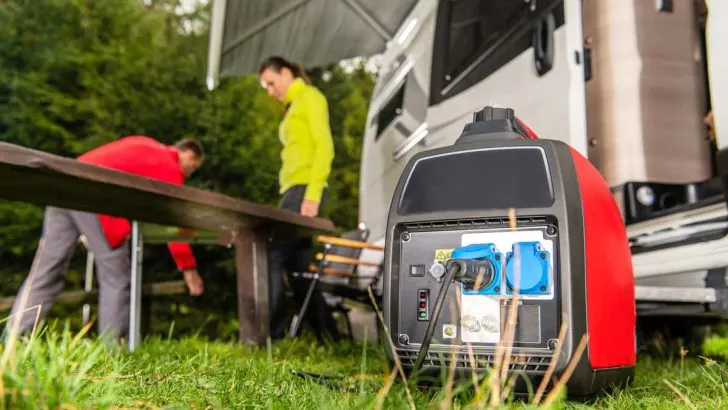A portable generator is a handy piece of equipment that you shouldn’t miss when camping, from powering your camper to cooling yourself on a hot afternoon. But there is always the risk of carbon monoxide poisoning. So, it’s essential to know how far it should be from your camper and which way it should face.
You should place your portable generator at least 20 feet (6 meters) away from your camper or the windows. Avoid placing it under your RV to prevent carbon monoxide infiltration. Carbon monoxide (CO) is a deadly gas that has been responsible for several deaths in RVs.
Read on to know how to use your portable generator safely when camping. I will also share more details on carbon monoxide poisoning from portable generators and how to avoid it.
Where Should a Generator Be Placed When Camping?
Carbon monoxide is a colorless, odorless, and deadly gas produced when burning fuel, such as:
- Propane
- Gasoline
- Wood
- Natural gas
- Charcoal
NPR estimates that portable generators emit as much carbon monoxide as 450 cars. Additionally, the Consumer Product Safety Commission estimates that over 900 people died between 2005 and 2017 of carbon monoxide poisoning from portable generators. And more than 15,400 patients were treated in emergency rooms from generator-related CO poisoning within the same period.
CO can kill quickly, especially in enclosed spaces. That’s why you should be careful where and how you place your portable generator when camping.
The CDC recommends placing your generator at least 20 feet (6 meters) away from your camper with the exhaust fumes facing away from the camper. This will ensure that no toxic fumes can get into your living space.
CDC also warns against operating a generator in your home or garage even with doors or windows open.
How To Use a Portable Generator on Your Camper Safely
You need to know a few safety precautions if you plan to camp off-grid and use a portable generator.
Placing your generators at least 20 feet (6 meters) away will necessitate a 20-25 feet (6-8 meter) long power cord. Look for open ground and let the exhaust pipe face the wind’s direction. You also need to avoid areas with tall grass or where the tail pipe’s heat can cause a fire.
You’ll require a unique electrical adapter to plug your camper into the generator’s receptacle. Most RVs come with 120-volt electrical systems, so you shouldn’t confuse a 30-amp, 120-volt plug, or 240-volt plug.
On the other hand, some portable generators are equipped with ordinary 20-amp household outlets and others with twist-lock receptacles. Therefore, it’s essential to know what type of generator you’re dealing with before buying an adapter plug for your camper.
Protect Your Generator From the Elements
Although portable generators are versatile equipment, they aren’t made to operate in the rain or snow. Exposing the electric alternator and other electronic parts of the generator can cause damage and possible electrocution.
Set up a temporary shelter away from your camper if it’s raining. I’d also recommend placing your generator under shelter overnight. Who knows, it might snow or rain while you sleep.
Consider Legal Restrictions
The use of portable generators is restricted on particular campsites during nighttime or selected quiet hours. As a result, you want to check with your local agencies to see if such restrictions exist before heading out to camp. You don’t want to be caught on the wrong side of the law.
Keep a Reasonable Distance Between You and Other Campers
Keeping your portable generator far enough from your trailer could leave it near other campers. As such, your camper’s noise and engine exhaust would invade nearby homes and trailers.
It would be best if you practice the art of balancing here. Keep your portable generator away from your camper and far enough from others such that it doesn’t harm them. You also don’t want altercations flaring up in the camp.
Campers With Installed Generators
Some RVs come with installed generators. If you have such a camper, ensure to have all the doors and windows of the camper closed to avoid exhaust fumes infiltrating into your camper. As mentioned earlier, you want to avoid having to deal with carbon monoxide poisoning.
Install CO Detectors in Your Camper
Federal agencies like CPSC and CDC recommend installing battery-operated CO detectors near living and sleeping areas and testing them regularly.
Buy a carbon monoxide detector that’s UL listed for use in a camper. Test it before heading out, and always check for expiration dates. Yes, smoke and CO detectors have expiration dates that you should always observe and replace the detectors when it’s due.
If you hear some chirping noises coming from your CO or smoke alarms, it’s time to replace the batteries.
You can consider this MOSUO Smoke and Carbon Monoxide Detector I found on Amazon.com. It’s UL 2017 and UL 2034 compliant and is highly sensitive and accurate.
What Are the Symptoms of Carbon Monoxide Poisoning?
“Prevention is better than cure,” so they say. But what would happen if CO infiltrates your camper? How would you know it has?
As I mentioned earlier, carbon monoxide is odorless and colorless, so it would be hard to detect if your CO detector is faulty or if you don’t have it all together. But you’d show some symptoms if you inhale small amounts of CO. Exposure to large amounts would kill you.
These are the symptoms of CO poisoning:
- Weakness
- Dizziness
- Confusion
- Blurred vision
- Dull headaches
- Nausea and vomiting
- Shortness of Breath
Don’t wait for the symptoms to take action. You might be dead long before you realize it. Carbon monoxide poisoning may also cause permanent brain damage. So take care.
Final Thoughts
Camping is an excellent way to experience nature and catch a break from your busy life. A portable generator comes in handy to power your RV but can be deadly if you don’t use it well. Therefore,
- Never use a generator indoors, whether at home or in a camper.
- Place it at least 20 feet (6 meters) and position the muffler to face away from your trailer and not in the direction of other campers or homes.
- Install smoke and CO detectors in your camper – CO poisoning is particularly deadly when you’re sleeping or incapacitated.
Recommended Reading:


